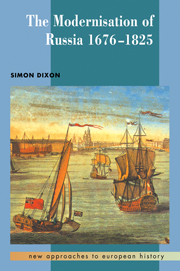5 - Government and justice
Published online by Cambridge University Press: 05 June 2012
Summary
The court
So dazzling was the court's display that its political significance is in danger of eclipse. Not even its composition has been properly studied. Yet the court lay at the heart of Russian government. Its ceremonial offered a magnificent representation of tsarist rule and constituted a distinctive form of power in itself; as the tsar's residence, the court exerted a magnetic attraction on all who hoped to influence him, thus becoming the forum of Russian politics and the fount of imperial patronage; and, under rulers who chose to exercise their prerogative as the ultimate decision-maker, the court became the crucible of personal monarchy.
The ambivalence of the word ‘court’ makes it hard to define. Yet whilst one must distinguish between the court as a government institution, as a society of the tsar's acolytes, and as the setting for both, to divorce any one of these meanings from the others is to lose sight of the distinctive whole. I shall therefore take a synthetic approach demonstrating that each tsar played a vital part in forming his own court ethos: in this sense, at least, Sir James Harris was right to declare in 1778 that, ‘in an absolute monarchy, everything depends on the disposition and character of the Sovereign’.
- Type
- Chapter
- Information
- The Modernisation of Russia, 1676–1825 , pp. 118 - 151Publisher: Cambridge University PressPrint publication year: 1999

